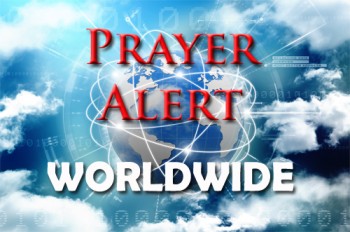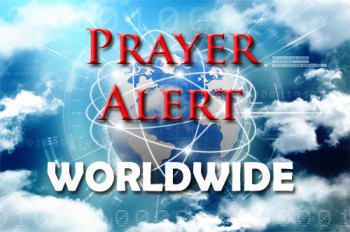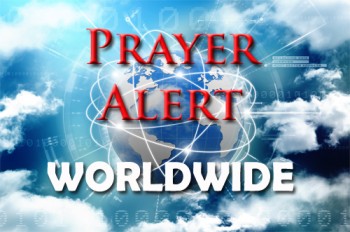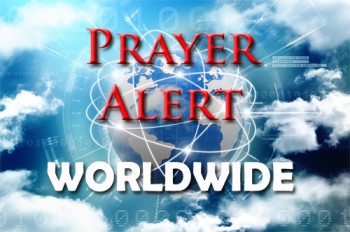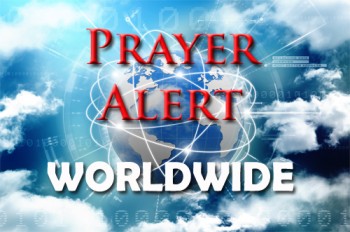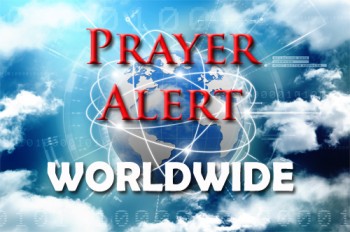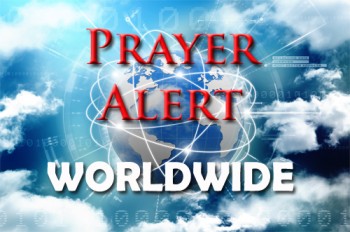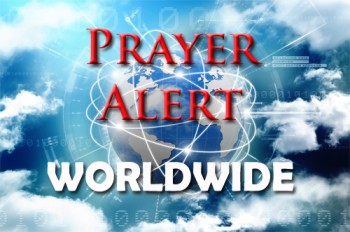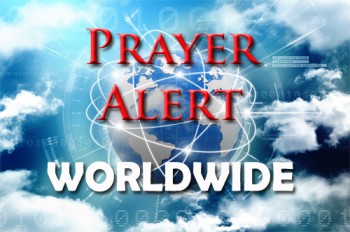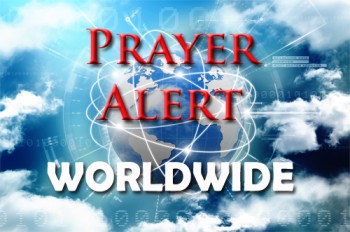Displaying items by tag: Africa
Nigeria: military kill Christian soldiers
Slaughtering Nigerian Christians continues unabated. An average of ten Christians are killed daily. A recent episode was at the hands of the government, which executed six Christian soldiers in Abuja on false charges. A Muslim colonel stole weapons from an armoury, but six Christian soldiers on duty got blamed for the theft. Their lawyer claimed they died ‘purely because they were Igbo and Christian. The government of today detests Christianity and detests the Igbo tribe.’ He had petitioned the government to provide a defence, but his attempt was denied and they were executed in secret. Nigeria’s constitution gives the military no authority to execute people, and prisoners should be able to appeal to a higher court. They didn’t get their rights. The military now claims that they were never executed, but they have not been seen by their families or in public.
Nigeria: Chibok girls and Boko Haram
In 2014, militants stormed a boarding school in Chibok and kidnapped 276 girls. Dozens escaped almost immediately; another girl was found in May 2016. After government/Boko Haram negotiations, 21 more girls were released, then 82 were freed in a prisoner swap in 2017. Since then, nothing had been heard of the remaining captives, until Halima Ali Maiyanga called her father to say she had managed to escape on 28 January. ‘She asked me, Is this my daddy? and she started crying. The crying was so much I couldn't hear her very well. I was crying too. I never expected to hear from her again. Our house is full of people rejoicing with us.’ Halima and others are safe and being looked after by the Nigerian army. While we praise God for their escape, please continue to pray for the remaining girls and their families.
Ethiopia: surge in violence - 1,000 deaths
Up to 1,000 people – including priests and church leaders – were killed in recent attacks in Ethiopia. A Belgium-based nonprofit organisation released reports of 1,000 people hiding in an Orthodox church in Aksum, thought to contain the Ark of the Covenant. They were brought out and shot in the square. 750 were definitely murdered, and possibly more of the injured died later. Inside Ethiopia there is political conflict. The government’s term of office ended in September, and the May elections were cancelled due to coronavirus. This has created political unrest where Christians and Muslims are dying in a long line of fatal assaults against innocent people in the Tigray region. 154 were killed in December in Maryam Dengelat, and ten from one family were killed on Christmas Day. Also, Eritrean troops have been killing dozens.
Tunisia: youth protests sweeping country
A growing groundswell of youth unrest, tapping into a well of economic frustration, is sweeping Tunisia, the country which triggered the 2011 ‘Arab Spring’. A third of the nation’s young people are unemployed. Many are angry about their poverty. Since 14 January they have taken to the streets in violent marches. There have been 1,000 arrests, and the army has been deployed in four hot spots. Protest groups are growing in size and are out in force every night staging simultaneous, often-violent demonstrations: pelting municipal buildings with stones, throwing Molotov cocktails, looting, vandalising, and clashing with police in poor, densely populated districts. By 24 January hundreds more were protesting against police repression, chanting, ‘No more fear, the streets belong to the people’ and ‘The people want the fall of the regime’ - popularised during the Arab Spring. They also called for the release of hundreds of protesters detained recently. See
Mozambique: drought, famine, unrest, refugees
In Cabo Delgado, most Internally Displaced People (IDPs) have lost access to their basic livelihoods due to years of conflict. Neighbouring areas that were previously classified as ‘stressed’ now face ‘crisis’ situations due to a rapid increase in IDPs. Conflict and even more IDPs has made many areas inaccessible for those distributing humanitarian aid. They are in ‘crisis’ situations. Some of the most affected families who have lost their homes and livelihoods face difficulty escaping to safe areas, and will face even worsening famine. Families in drought areas are consuming wild foods due to low income and exhausted food stocks. Unfortunately, poorly distributed rainfall through December limited planting in southern Mozambique. Please pray that food security will begin to improve in April 2021 with the start of the harvest. Pray also for the poorest households recovering from Cyclone Idai but contending with worsening economic shock due to Covid-19.
Nigeria: ‘No evil will take away our faith’
A Christmas Eve attack by Boko Haram which left at least eleven dead and two church buildings razed to the ground prompted Nigerian bishop Oliver Dashe Doeme of Maiduguri to issue a rallying cry, insisting Islamist violence is doomed to failure. Bishop Oliver said he was undaunted by the attack in Pemi, near Chibok, where over 270 mostly Christian schoolgirls had been kidnapped in 2016. Speaking after the attack, in which a priest was abducted, he said, ‘One thing that Boko Haram will never take from us is our faith. We will never allow our faith to be taken away by any evil. Our faith is becoming stronger and stronger. 100 people were baptised in one parish on Christmas Eve. People are so committed.’ The Bishop said that Boko Haram’s actions were in fact strengthening the Christian faith; his diocese has more Catholics than when there was no Boko Haram crisis.
Nigeria: struggles
Bullets fly overhead as schoolboys scream out in fear. Chaos. Shrapnel. Hundreds go missing. This was the scene last week when Boko Haram militants stormed a high-school in Katsina, northern Nigeria, to abduct hundreds of students, 400 remain missing. It is a horror story reminiscent of the 2014 kidnapping of schoolgirls that prompted the viral #BringBackOurGirls campaign. The attack came just weeks after the brutal slaying of Nigerian farmers in Borno state by militants on motorcycles (thirty were beheaded). Nigeria's population is 50% Christian and 50% Muslim with groups like Boko Haram subscribing to a warped interpretation of Islam that justifies murder of Christians. In practice, both Christians and Muslims have been targeted in recent years. Pray for the government to improve its standards and protect vulnerable communities. Pray the authorities will also terminate the Special Anti-Robbery Squad’s contract to end the torture and extrajudicial killings that it has engaged in. STOP PRESS: it has now been reported that all the schoolboys have been released by Boko Haram. See
Egypt: Christians persecuted
Christians in Egypt are not safe, despite the authorities’ claims to the contrary. The following tragedy shows the dangers Christians must navigate in Egyptian society, and their disbelief that help will come in the form of justice. Persecution is more than violence; it is also about how the authorities respond to these injustices. On 10 December three Muslim brothers attacked Coptic Christians living in Alexandria, murdering one man and significantly injuring two with knives and clubs, then damaging three Christian shops. The brothers have a history of thuggery and escalated harassment of Christian shop owners. They were arrested, but local Christians fear that they will be declared mentally unstable and not fully punished, as has happened before in similar cases. Violence against Christians is commonplace in Egypt, but this happened in Alexandria, where sectarian tensions are normally subtler than in Upper Egypt.
DR Congo: Christians murdered and raped in jihadi attacks
Between 20 November and 3 December, at least thirty Christians were killed, and ten young women and girls raped, in attacks on five villages by the extremist Allied Democratic Forces. Locals described scenes of terrified Christians flooding into the streets as the jihadists surrounded churches, armed with guns, clubs, machetes, swords and axes. Fourteen Christians with severe wounds are in hospital in a critical condition, and at least fifteen people were abducted. A survivor, hiding in the latrine, watched through a vent as his wife and three children were murdered. A pastor In Mayitike said the militants tried to force villagers to convert to Islam before killing them. When his family refused to convert, they shot his wife in the head and cut their four children into pieces with a sword.
Ethiopia: thousands displaced by conflict in Tigray
Ashenafi Hailu was racing on his motorcycle to the aid of a friend trapped by the Ethiopian government’s military offensive in the Tigray region when a group of men on foot confronted him, identifying themselves as militia members of a rival ethnic group. They dragged him by a noose to save bullets. As the noose tightened around his neck he thought he would die. He passed out and awoke alone near a pile of bodies. His motorcycle and cash were gone. Nearly 50,000 Ethiopians fleeing Tigray have sought safety in Sudan, in what the UN called the worst exodus of refugees Ethiopia has seen in over two decades. Reports of looting, ethnic antagonism, and killings are at odds with Ethiopia’s prime minister saying, ‘No civilians are being hurt.’ Worrying prospects are that the fighting is degenerating into a guerrilla war that could unravel both Ethiopia’s national fabric and the stability of the entire Horn of Africa region, including Eritrea and Sudan.
